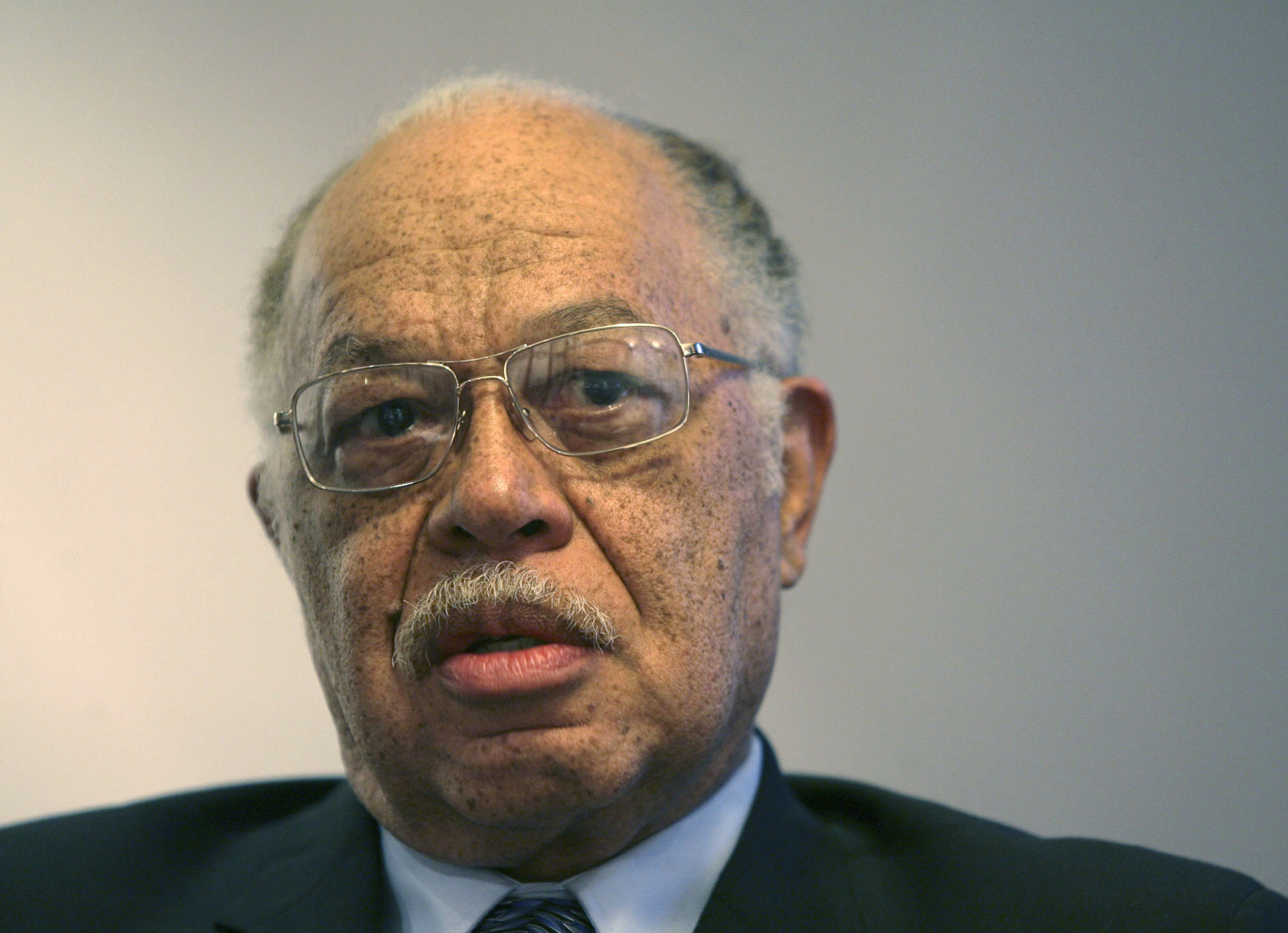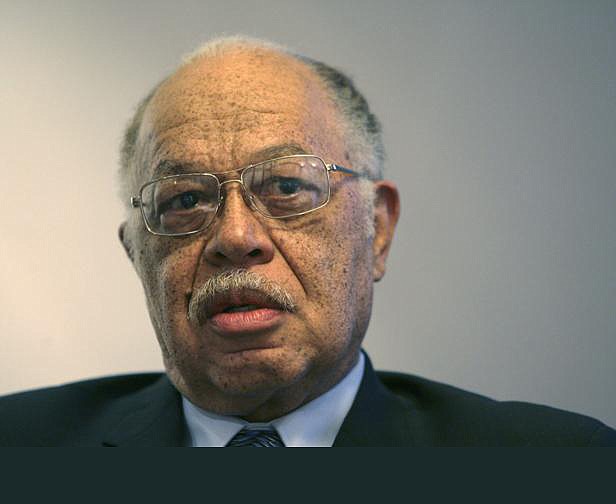 In this March 8, 2010 file photo, Dr. Kermit Gosnell is seen during an interview with the Philadelphia Daily News at his attorney's office in Philadelphia. Gosnell was found guilty Monday, May 13, 2013 of found guilty of first-degree murder in the deaths of three babies born alive but acquitted in the death of a fourth baby. Gosnell was also found guilty of involuntary manslaughter in the overdose death of a patient. (AP Photo/Philadelphia Daily News, Yong Kim, File)
In this March 8, 2010 file photo, Dr. Kermit Gosnell is seen during an interview with the Philadelphia Daily News at his attorney's office in Philadelphia. Gosnell was found guilty Monday, May 13, 2013 of found guilty of first-degree murder in the deaths of three babies born alive but acquitted in the death of a fourth baby. Gosnell was also found guilty of involuntary manslaughter in the overdose death of a patient. (AP Photo/Philadelphia Daily News, Yong Kim, File)PHILADELPHIA - Dr. Kermit Gosnell considered himself a pioneering inner-city doctor who helped desperate women get late-term abortions, but a Philadelphia jury called him a murderer who killed three babies after they were born alive.
Gosnell, 72, was convicted Monday of three counts of first-degree murder but acquitted of murdering a fourth aborted baby. He was also found guilty of manslaughter, not third-degree murder, in a patient's 2009 overdose death.
The same jury that returned that measured verdict after 10 days behind closed doors is set to return next week to decide if Gosnell deserves the death penalty.
Prosecutors want to send Gosnell to death row because he killed more than one person, and his victims were especially vulnerable given their age. But Gosnell's advanced age makes it unlikely he would ever be executed before his appeals ran out. Prosecutors might offer a life sentence if he agrees to give up those appeals.
Defense lawyer Jack McMahon called such negotiations commonplace, but declined to discuss whether they were likely in this case.
"The media has been overwhelmingly against him," McMahon said, calling Gosnell's case an uphill battle. "But I think the jury listened to the evidence ... and they found what they found. ... Five murder counts were not guilty, and so they obviously took their job seriously."
Philadelphia District Attorney Seth Williams, whose office undertook a grand jury investigation after the FBI stumbled upon the rogue abortion practices during a 2010 drug raid, declined comment until the sentencing phase concludes. That hearing is set to start May 21.
But partisans on both sides of the nation's polarized abortion debate were quick to weigh in after the verdict.
"This has helped more people realize what abortion is really about," said David O'Steen, executive director of the National Right to Life Committee. He said he hopes the case results in more states passing bills that prohibit abortion "once the unborn child can feel pain."
The gruesome details came out more than two years ago during the grand jury investigation of prescription drug trafficking at Gosnell's clinic. Investigators said it was a foul-smelling "house of horrors" with bags and bottles of fetuses, including jars of severed feet, along with bloodstained furniture, dirty medical instruments, and cats roaming the premises.
Supporters of legalized abortion said the case offered a preview of what poor, desperate young women could face if abortion is driven underground with more restrictive laws.
"Kermit Gosnell has been found guilty and will get what he deserves. Now, let's make sure these women are vindicated by delivering what all women deserve: access to the full range of health services including safe, high-quality and legal abortion care," said Ilyse G. Hogue, president of NARAL Pro-Choice America.
The jury foreman braced himself and uttered a tense sigh before facing Gosnell to deliver the verdict Monday afternoon. Gosnell remained calm, offering the same bemused smile he has shown throughout the two-month trial. He proved a solitary figure from beginning to end, with no friends or relatives in the courtroom, despite the fact he's been married three times and has six children, nearly all of them adults.
Gosnell did not testify, and called no witnesses in his defense. But McMahon branded prosecutors "elitist" and "racist" for pursuing his client, who is black and whose patients were mostly poor minorities.
"I wanted to be an effective, positive force in the minority community," Gosnell told The Philadelphia Daily News in a 2010 interview. "I believe in the long term I will be vindicated."
Former clinic employees testified that Gosnell routinely performed illegal abortions past Pennsylvania's 24-week limit, that he delivered babies who were still moving, whimpering or breathing, and that he and his assistants dispatched the newborns by "snipping" their spines, as he referred to it.
Gosnell was also convicted of infanticide, racketeering and more than 200 counts of violating Pennsylvania's abortion laws by performing third-term abortions or failing to counsel women 24 hours in advance.
His co-defendant, former clinic employee Eileen O'Neill, was convicted of taking part in a corrupt organization and illegally billing for her services as if she were a licensed doctor.
Four former clinic employees pleaded guilty to murder and four more to other charges. They include Gosnell's wife, Pearl, a cosmetologist who helped perform abortions.
Pennsylvania authorities had failed to conduct routine inspections of all its abortion clinics for 15 years by the time Gosnell's facility was raided. In the scandal's aftermath, two top state health officials were fired, and Pennsylvania imposed tougher rules for clinics.
After prosecutors rested their five-week case last month, Common Pleas Judge Jeffrey Minehart threw out three of the seven murder counts involving aborted fetuses for lack of evidence. That left the jury to weigh charges involving fetuses identified as Baby A, Baby C, Baby D and Baby E.
Prosecution experts said one was nearly 30 weeks along when the abortion took place, and was so big that Gosnell allegedly joked the baby could "walk to the bus." A second baby was said to be alive for about 20 minutes before a clinic worker snipped the neck. A third was born in a toilet and was moving before another clinic employee severed the spinal cord, according to testimony.
Baby E let out a whimper before Gosnell cut the neck, prosecutors alleged. Gosnell was acquitted in that baby's death, the only one of the four in which no one testified to seeing the baby killed.
Gosnell's attorney argued that none of the fetuses was born alive and that any movements were posthumous twitching or spasms.
The defense also contended that the 2009 death of 41-year-old Karnamaya Mongar of Woodbridge, Va., a Bhutanese immigrant who had been given repeated doses of Demerol and other powerful drugs to sedate her and induce labor, was caused by unforeseen complications and did not amount to murder, as prosecutors charged.
Bernard Smalley, a lawyer for the woman's family, said he now hopes to bring "some sense of justice and quiet to this family that's been through so much."
